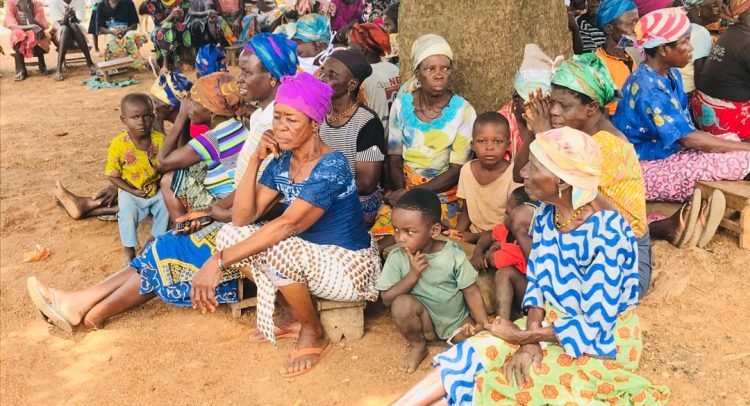Some inmates of the Gnani witches camp
Across the world, the Covid-19 pandemic has greatly affected lives and brought economic activities and livelihoods of many including the marginalized group to a standstill.
The inmates living at the various alleged witch camps in Northern Ghana are a case of reference. A recent visit to the Gambaga and Gnani camps in the Northern and North East regions by DGN Online revealed that, majority of the women who engaged in farm labour to earn their daily incomes could no longer do that due the pandemic.
“Usually we could go and work in someone’s farm; it could be sowing, weeding or even harvesting and you get paid. That money or whatever you will get is what sustains you here, but now, we are not getting that.” Kolgu Tindana, one of the inmates at the Gambaga Camp said
Those that engages in large cultivations within the Gambaga area most often hire the services of the inmates for their farm works which helps to sustain most of the women who do not have any business on their own.
They often do menial works such as this to feed themselves as well as look after their children who they run to the camps with.
Another inmate at the Gambaga camp, Guma Wuni tells DGN Online that the pandemic brought a lot of hardship beyond their understanding.
“Before covid-19 we used to work at peoples farm and they give us some of the farm produce which we bring to the camp to share to our colleagues here who are too old to work again so they can also feed themselves but now we cannot even go out not to talk of farming or do anything to get something to live on.”
The Gambaga witches camp is located at the heart of the town of Gambaga just by the Chief palace and it is supported by the Presbyterian Church of Ghana under its Go Home initiative.
The camp currently houses 80 alleged witches who run for rescue with their children. The rooms are semi-hats and appeared not to be in good condition for habitation, a clear reflection of the massive accommodation constraint that besets the camps throughout the region.
Similar semi-hats structures built with mud and roofed with thatches are where the women are kept. interior views of the rooms appeared darker, ridden with cobwebs and no electricity for many of the rooms.
The situation was not different at the Gnani alleged witch Camp in the Yendi Municipality of the Northern Region.
The camp has 180 women with more nearly 700 children and grandchildren living with them.
There is no public school in the community leaving the children who are desirous to attend school to walk about 2 miles daily in search of knowledge at the expense of their poor mothers.
Life under Covid has not been easy for almost all of them at the camp according to Wumbei Kofi, one of the alleged witches at the Gnani Camp.
“We don’t have any work again. the work has spoiled this year. The people in this town will normally call us to work on their farms and there we can make something for ourselves. When you take that, you can feed your children. But now we are begging to survive.”
Conditions at the camps has always not been the best for the women as they are left in deplorable conditions but with the coming in of the Covid 19, things further worsened as peoples visit and donations has stopped.
Back at the Gambaga Camp, Ayishetu Dokurugu who has lived there for almost 8 years feels the solution to their hardship situation is for the government and good individuals to come to their aid by providing them with life-skills that would enable them to make earns meet.
“when we get support to enhance our businesses like Shea butter processing, and soap making we will be able to support ourselves and take our children to school as well.”
The Project Coordinator for the GO Home Project the Gambaga alleged witches camp, Sampson Laar, told DGN Online that because of the covid-19 protocols , the camp could not allow the inmates to move out due to the fear of contracting the virus which made things difficult for managers of the camp to feed them.
“they are very old and they stay in pers in their rooms so if one of them should contract the virus, it means almost all of them will get it so it has been very difficult for us how to feed them, getting soaps and detergents to wash their clothes.”
“we are really stranded and we don’t know how to do and feed the alleged witches in the camp, we are calling on everyone to support us with food because if we are able to feed them, they cannot go out and they will be protected at the camp to help prevent them from contracting the virus.”
He indicated that the camp lacks Personal protective equipment (PPE) which is a worry to them regarding the fight against covid-19.
“we do not have PPEs apart from the nose masks, we don’t have soaps, sanitizers absolutely nothing for now.”
Mr. Laar appealed organizations, individuals to support the camp with food and Personal protective equipment (PPE).
FROM Eric Kombat, Tamale


